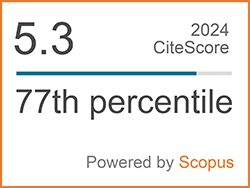The Influence of Manganese Oxide on the Densification and Mechanical Properties of 3Y-TZP Ceramics
Abstract
With outstanding integration of mechanical performances and biocompatibility, 3 mol% of yttria stabilised tetragonal zirconia polycrystals (3Y-TZP) ceramic are extensively fabricated as biomedical implants. Conventional sintering (CS) was generally employed to produce 3Y-TZP bodies with promising densification, which resulted in grain coarsening and mechanical properties deterioration due to elevated sintering temperatures (> 1500°C). The main weakness of 3Y-TZP ceramic is the spontaneous tetragonal to monoclinic phase transformation under humid environment, which is known as low-temperature degradation (LTD). In present work, undoped and MnO2 (0.3 and 0.5 wt%) doped 3Y-TZP green bodies were prepared and subjected to CS at 1200–1500°C for an hour of dwelling time. It was found that the optimum concentration of MnO2 dopant was 0.5 wt%. Reasonable toughness values of 5–7 MPa.m1/2 revealed the tetragonal phase stability of 3Y-TZP grains was not altered by doping of MnO2. Moreover, outstanding density level of > 96% of 0.5 wt% MnO2 doped 3Y-TZP ceramics demonstrated the superb Young’s modulus of > 200 GPa and Vicker’s hardness of >13 GPa. Fabrication of 3Y-TZP by doping MnO2 had reduced the total processing time by ~ 9% and sintering temperature by up to 150°C when compared to undoped 3Y-TZP ceramics sintered at 1400°C.
Keywords
DOI: 10.14416/j.asep.2020.04.002
Refbacks
- There are currently no refbacks.
 Applied Science and Engineering Progress
Applied Science and Engineering Progress







